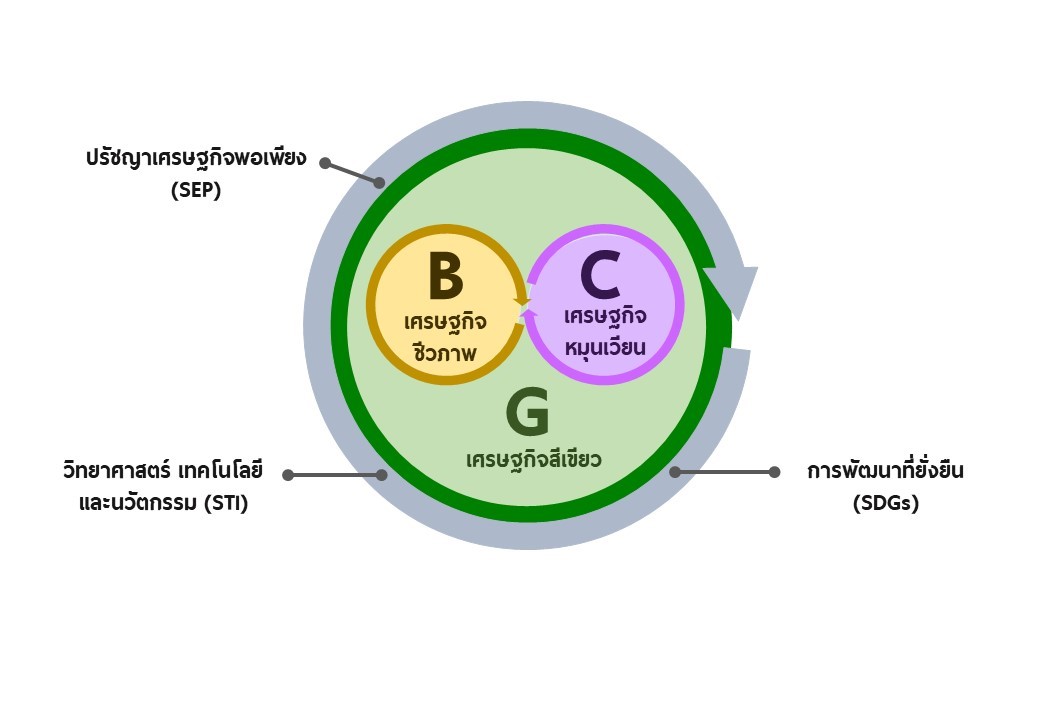แนวคิดสะเต็มบีซีจีเพื่อการศึกษา
Main Article Content
Abstract
Chatree Faikhamta, Naphat Suknarusaithagul, Saharad Yokyong, Pongsaton Panyanukit, Tharuesean Prasoplarb, Kanoktep Muangsong, Janthima Ninubon and Namon Nuamcharoen
รับบทความ: 17 มิถุนายน 2565; แก้ไขบทความ: 27 กันยายน 2565; ยอมรับตีพิมพ์: 3 ตุลาคม 2565; ตีพิมพ์ออนไลน์: 22 ธันวาคม
บทคัดย่อ
สะเต็มศึกษาเป็นแนวทางการจัดการเรียนรู้ที่ต่างประเทศทั่วโลกใช้พัฒนาผู้เรียนให้เป็นนัก-แก้ปัญหาและนวัตกร โดยมีเป้าหมายเตรียมความพร้อมให้ผู้เรียนเป็นพลเมืองที่มีสมรรถนะต่อการดำรงชีพในชีวิตจริงและการประกอบอาชีพในโลกยุคดิจิทัล ถึงแม้ว่าสะเต็มศึกษาเข้ามามีบทบาทสำคัญในประเทศไทยตั้งแต่ปีพุทธศักราช 2557 อย่างไรก็ตามยังคงมีปัญหาที่ฝังรากลึกมาตลอด คือ หลักสูตรและแนวทางการจัดการเรียนรู้สะเต็มศึกษาส่วนใหญ่ยังไม่สามารถสร้างเสริมศักยภาพเพื่อพัฒนาผู้เรียนให้เกิดกระบวนการแก้ปัญหาและสร้างสรรค์นวัตกรรมจากบริบทชีวิตจริงที่ครอบคลุมมิติด้านเศรษฐกิจ สังคม และสิ่งแวดล้อม กอปรกับในปัจจุบันรัฐบาลไทยพยายามดำเนินการขับเคลื่อนประเทศด้วยโมเดลเศรษฐกิจบีซีจี โดยโมเดลดังกล่าวมีเป้าหมายที่ตอบโจทย์ประเด็นท้าทายในด้านเศรษฐกิจ สังคม และสิ่งแวดล้อมให้เกิดความสมดุล เพื่อการพัฒนาที่ยั่งยืน ดังนั้นบทความวิชาการฉบับนี้ คณะผู้นิพนธ์จึงขอเสนอกรอบแนวคิดสะเต็มบีซีจีเพื่อการศึกษา ซึ่งเป็นกรอบแนวคิดใหม่สำหรับภาคการศึกษาที่มีการบูรณาการโมเดลเศรษฐกิจบีซีจีและสะเต็มศึกษาเข้าด้วยกันเพื่อช่วยยกระดับการเรียนรู้ตามแนวทางสะเต็มศึกษาของผู้เรียนให้สอดคล้องกับการขับเคลื่อนประเทศด้วยโมเดลเศรษฐกิจบีซีจีอย่างเป็นรูปธรรม และพัฒนาผู้เรียนให้เกิดสมรรถนะหลักที่สอดคล้องกับการศึกษาฐานสมรรถนะเพื่อนำไปสู่การเป็นผู้มีสุขภาวะต่อไป
คำสำคัญ: สะเต็มศึกษา โมเดลเศรษฐกิจบีซีจี การพัฒนาอย่างยั่งยืน การมีสุขภาวะ สมรรถนะหลัก
Abstract
STEM education is a learning approach widely used for developing students to become problem solvers and innovators. Its objectives are to empower students to be citizens prepared to live in the real world and have the competencies required for careers in the digital transformation era. Even though STEM education has played a significant role in Thailand education since 2012, it has been plagued by deep–seated problems, as the STEM curriculum and approach have failed to support students' performances in problem–solving and innovation in authentic contexts including the economy, society, and environment. In addition, Thai's government launches the BCG economy model aiming at developing the country to a balanced economy, society, and environment with sustainable development. This article aims to present the STEM BCG model, which is an innovative framework for education. This framework is expected to raise the level of STEM education that follows the economic policy of the Thai government through empirical action and improve students’ core competencies which are based on competency–based education, leading to well–being.
Keywords: STEM education, BCG economy model, Sustainable development, Well–being, Core competencies
Downloads
Article Details

This work is licensed under a Creative Commons Attribution-NonCommercial 4.0 International License.
References
Boon Ng, S. (2019). Exploring STEM Competences for the 21st Century. United Nations: UNESCO International Bureau of Education.
Bioeconomy Research Community Circular Economy and Green Economy. (2018). White Paper BCG in Action Science, Technology, and Innovation Development of Thailand for the Bio–economy Circular Economy and Green Economy Bio–Circular–Green Economy. Retrieved from http://stiic.sti.or.th/wp-content/ uploads/ 2018/10/BCG_Final1.pdf, June 16, 2022. (in Thai)
Bybee, R. W. (2013). What is your perspective of STEM education? In The case for STEM Education: Challenges and Opportu-nities (pp. 73–80). USA: National Science Teachers Association.
Crippen, K. J., and Archambault, L. (2012). Scaffolded inquiry–based instruction with technology: A signature pedagogy for STEM education. Computers in the Schools 29(1–2): 157–173.
Dedovets, Z., and Rodionov, M. (2015). The development of Student Core Competencies through the STEM education opportunities in classroom. International Journal of Social, Behavioral, Educational, Economic, Business and Industrial Engineering 10: 3237–3240.
Jang, H. (2016). Identifying 21st century STEM competencies using workplace data. Jour-nal of Science Education and Technology 25(2): 284–301.
Ladachart, L., Phothong, W., Rittikoop, W., and Ladachart, L. (2019). Teachers’ understanding and views about STEM education and engineering design. Journal of Education Burapha University 30(10): 89–103. (in Thai)
Li, Y., Wang, K., Xiao, Y., and Froyd, J. E. (2020). Research and trends in STEM education: A systematic review of journal publications. International Journal of STEM Education 7(1): 1–16.
Kaewklom, W., Khumwong, P., and Dahsah, C. (2018). Current situation, problem and needs for STEM learning of primary science teacher. Viridian E–Journal, Sil-pakorn University (Humanities, Social Sciences, and Arts) 11(3): 2092–2112. (in Thai)
Kelley, T. R., and Knowles, J. G. (2016). A conceptual framework for integrated STEM education. International Journal of STEM Education 3(1): 1–11.
Kereluik, K., Mishra, P., Fahnoe, C., and Terry, L. (2013). What knowledge is of most worth: Teacher knowledge for 21st century learning? Journal of Digital Learning in Teacher Education 29(4): 127-140.
Kovitvadhi, U., Ketsing, J., Faikhamta, C. Koviyvadhi, A., Sangsawang, A., Chumnanpuen, P., Hirunwong, A., Wongoutong, C., Fungfuang, W., Vongsangnak, W. and SubKaew, J. (2021). Guideline of Local Curriculum for Black Soldier Fly (Hermetia illucens). Bangkok: Kasetsart University. (in Thai)
Khamput, C., Srikoon, S., and Bamroongkit, S. (2021). The research synthesis of STEM education in Thailand. Mahachulalongkornrajavidyalaya University, Chiang Mai Campus 12(1): 189–204. (in Thai)
Ministry of Higher Education, Science, Research, and Innovation. (2022). Action Plan for Driving Thailand Development with the BCG Economy Model 2021–2022. Retrieved from https://www.bcg.in.th/bcg-action- plan/, June 16, 2022. (in Thai)
OECD. (2013). OECD Guidelines on Mea-suring Subjective Well–being.Retrieved from https://www.oecd.org/wise/oecd-guide lines-on-measuring-subjective-well-being-9789264191655-en.htm, June 16, 2022.
Office of the Basic Education Commission Ministry of Education. (2022). (draft) Edu-cation Curriculum Framework. Retrieved from https://cbethailand.com, June 16, 2022. (in Thai)
Pache, A., and Lausselet, N. (2022). Working on ESD teacher competences in Switzerland: A case study at the University of Teacher Education Vaud. In Competences in Education for Sustainable Deve-lopment (pp. 113–119). Switzerland: Springer.
Pleasants, J., and Olson, J. K. (2019). What is engineering? Elaborating the nature of engineering for K–12 education. Science
Education 103(1): 145–166.
Promboon, S., Finley, F. N. and Kaweekijmanee, K. (2018). The evolution and current status of STEM education in Thailand: Policy directions and recommendations. In Education in Thailand (pp. 423–459). Singapore: Springer.
Suriyabutr, A., and Williams, J. (2021). Inte-grated STEM education in the Thai secondary schools: challenge and addressing of challenges. In Journal of Physics: Conference Series (pp. 1–9). Yogyakarta, Indonesia: IOP.
Tan, A. L., Ong, Y. S., Ng, Y. S. and Tan, J. H. J. (2022). STEM problem solving: Inquiry, concepts, and reasoning. Science & Education (29 January 2022): 1–17.
Tan, H., and Kidman, G. (2021). Authentic assessment in STEM education: An integrative review of research. In Authentic Assessment and Evaluation Approaches and Practices in a Digital Era (pp. 24–52). Netherlands: Brill.
Thailand Institute of Scientific and Technological Research. (2019). Circular Economy: A circular economy that should know. Pathum Thani: Thailand Institute of Scientific and Technological Research. (in Thai)
The National Economic and Social Development Board. (2018). National Strategy 2018–2037. Retrieved from http://nscr.nesdb.go.th/wp-content/uploads/ 2019/10/ National-Strategy-Eng-Final-5-OCT-2019. pdf, June 16, 2022. (in Thai)
Taylor, P. C. (2020). Transformative STE (A) M education for a sustainable world. Inter-national Joint Conference on Arts and Humanities (IJCAH 2020) (pp. 1–3). East Java, Indonesia: Atlantis.
